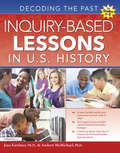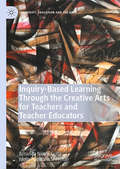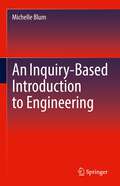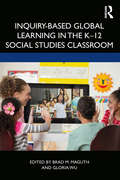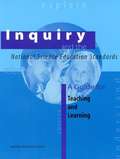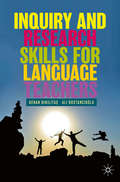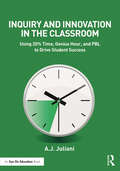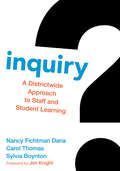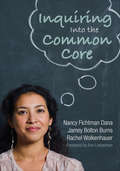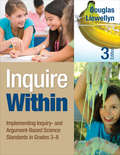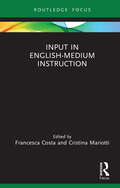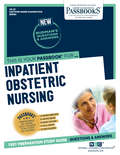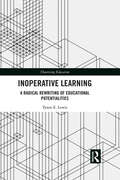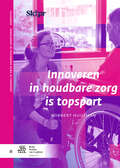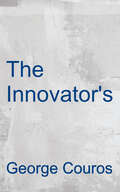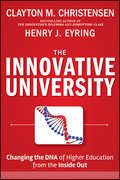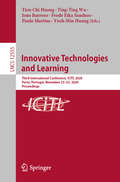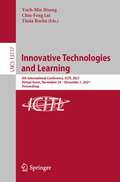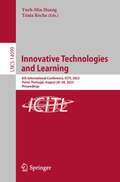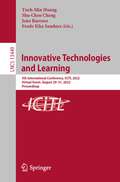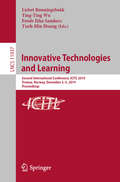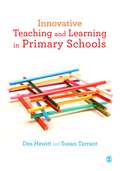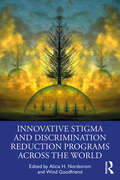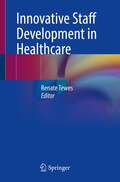- Table View
- List View
Inquiry-Based Lessons in U.S. History: Decoding the Past (Grades 5-8)
by Jana Kirchner Andrew McMichaelInquiry-Based Lessons in U.S. History: Decoding the Past provides primary source lessons that focus on teaching U.S. history through inquiry to middle school students. Students will be faced with a question to answer or problem to solve and will examine primary sources for evidence to create hypothetical solutions. The chapters focus on key chronological periods (e.g., the Age of Exploration to the Civil Rights era) and follow the scope and sequence of major social studies textbooks, with activities linked to the U.S. History Content Standards and the Common Core State Standards for Literacy in History/Social Studies. The three lesson plans in each chapter begin with an essential question that sets the focus for the primary sources and teaching strategies that follow. The lesson plans include differing types of primary sources such as photographs, speeches, political cartoons, historic maps, paintings, letters, and diary entries.Grades 5-8
Inquiry-Based Learning Through the Creative Arts for Teachers and Teacher Educators (Creativity, Education and the Arts)
by Amanda Nicole Gulla Molly Hamilton ShermanThis book is a theoretical and practical guide to implementing an inquiry-based approach to teaching which centers creative responses to works of art in curriculum. Guided by Maxine Greene’s philosophy of Aesthetic Education, the authors discuss the social justice implications of marginalized students having access to the arts and opportunities to find their voices through creative expression. They aim to demystify the process of inquiry-based learning through the arts for teachers and teacher educators by offering examples of lessons taught in high school classrooms and graduate level teaching methods courses. Examples of student writing and art work show how creative interactions with the arts can help learners of all ages deepen their skills as readers, writers, and thinkers.
An Inquiry-Based Introduction to Engineering
by Michelle BlumThe text introduces engineering to first-year undergraduate students using Inquiry-Based Learning (IBL). It draws on several different inquiry-based instruction types such as confirmation inquiry, structured inquiry, guided inquiry, and open inquiry, and all of their common elements. Professor Blum’s approach emphasizes the student’s role in the learning process, empowering them in the classroom to explore the material, ask questions, and share ideas, instead of the instructor lecturing to passive learners about what they need to know. Beginning with a preface to IBL, the book is organized into three parts, each consisting of four to ten chapters. Each chapter has a dedicated topic where an initial few paragraphs of introductory or fundamental material are provided. This is followed by a series of focused questions that guide the students’ learning about the concept(s) being taught. Featuring multiple inquiry-based strategies, each most appropriate to the topic, An Inquiry-Based Approach to Introduction to Engineering stands as an easy to use textbook that quickly allows students to actively engage with the content during every class period.
Inquiry-Based Global Learning in the K–12 Social Studies Classroom
by Brad M. Maguth Gloria WuThis book, edited by experienced scholars in the field, brings together a diverse array of educators to showcase lessons, activities, and instructional strategies that advance inquiry-oriented global learning. Directly aligned to the College, Career, and Civic Life (C3) Framework for Social Studies State Standard, this work highlights ways in which global learning can seamlessly be interwoven into the disciplines of history, economics, geography, civics, psychology, sociology, and anthropology. Recently adopted by the National Council for the Social Studies, the nation’s largest professional organization of history and social studies teachers, the C3 Framework prioritizes inquiry-oriented learning experiences across the social studies disciplines in order to advance critical thinking, problem solving, and participatory skills for engaged citizenship.
Inquiry and the National Science Education Standards: A Guide for Teaching and Learning
by Committee on Development of an Addendum to the National Science Education Standards on Scientific InquiryThis practical guide to teaching inquiry and teaching through inquiry is the long awaited addendum to the 1995 National Science Education Standards. This terrific new book illustrates how inquiry-based education helps students learn science content, master how to do science, and truly understand the nature of science. It will be an important resource for all educators, but especially relevant to those who help others understand why science can't be taught "the way it used to be."
Inquiry and Research Skills for Language Teachers
by Kenan Dikilitaş Ali BostancıoğluThis book equips pre-service language teachers with research and inquiry skills which they can use in the course of their classroom teaching. Research is presented not as an additional burden in teachers’ busy lives but as an integrated tool for satisfying their curiosity, developing an investigative stance, and strengthening the links between theory and practice. Over the course of the book, the authors introduce and encourage the use of pedagogically exploitable pedagogic-research activities (PEPRAs) to develop a deeper understanding of pedagogic issues in an engaging, supportive, and collaborative way. This book will be of interest to students and instructors on TESOL and related courses, as well as practitioners working in the teacher training sector.
Inquiry and Innovation in the Classroom: Using 20% Time, Genius Hour, and PBL to Drive Student Success
by A.J. JulianiCareers in the 21st century are changing, but traditional education methods are not preparing students for these new jobs and demands. In this thought-provoking book, esteemed educator A.J. Juliani describes how we need to modify our classrooms to instill in students the drive for inquiry and innovation that they will need to succeed beyond school doors. Juliani reveals the ways that teachers can use Google’s 20% Time, Genius Hour, and Project-Based Learning to make students more creative, inquisitive, engaged in learning, and self-motivated—the kind of people we need to move society forward! He offers easy ways to implement these ideas while meeting the Common Core and still allowing plenty of time for content instruction. Special Features: Research on the benefits of inquiry-based learning Connections to the Common Core State Standards Stories and examples from the field Exciting ideas for using 20% Time, Genius Hour, and PBL at various grade levels Tips for preparing parents and administration for your new instruction Ideas for expanding your knowledge and continually learning in this area Classroom applications for each chapter, including sample projects and resources Bonus content with reproducible materials that you can use in your classroom right now, such as student checklists, questions, lessons, and unit plans As Juliani emphasizes, if we want our students to change the world, we must change our classrooms to foster inquiry and innovation.
Inquiry: A Districtwide Approach to Staff and Student Learning
by Nancy Fichtman Dana Carol M. Thomas Sylvia S. BoyntonNow that federal and state initiatives require school districts to provide job-embedded professional development, the next step is making it happen. This book helps districts define, develop, and implement a systematic inquiry-based process with a laser-like focus on both adult and student learning. This book’s inquiry model challenges educators and students to: <p><p> Define questions they are passionate about exploring <p> Collect and analyze data to inform their questions <p> Share what they have learned through the process with others <p> Collaborate to build on their results and improve student achievement
Inquiring Into the Common Core
by Nancy Fichtman Dana Jamey B. Burns Rachel M. WolkenhauerCommon Core implementation begins with asking the right questions! While the Common Core couldn’t be clearer about what to teach, they never quite tackle how to teach. That’s what makes Inquiring into the Common Core such an essential resource. It offers teachers an inquiry-based professional development model for achieving greater understanding of the standards themselves, then determining best ways to realize desired outcomes. Posing questions to stimulate action and higher-level insight, teachers and students engage in a parallel process in service of the very same Common Core goals. The book is their guide, providing Tools to systematically study teaching effectiveness while adapting to new standards Classroom-ready, student inquiry techniques and strategies to apply within Common Core’s framework Real life inquiry-implementation examples from a high-need, high-poverty school
Inquire Within: Implementing Inquiry- and Argument-Based Science Standards in Grades 3-8
by Douglas J. LlewellynYour definitive guide to inquiry- and argument-based science—updated for today’s standards! Doug Llewellyn’s two big aims with this new edition of Inquire Within? To help you engage students in activities and explorations that draw on their big questions, then build students’ capacity to defend their claims. Always striking a balance between the “why” and the “how,” new features include how to Teach argumentation, a key requirement of both the Common Core and NGSS Adapt your existing science curricula and benefit from the book’s many lesson plans Improve students’ language learning and communication skills through inquiry-based instruction Develop your own inquiry-based mindset
Input in English-Medium Instruction (Routledge Focus on English-Medium Instruction in Higher Education)
by Francesca Costa Cristina MariottiThis edited book investigates the input provided by lecturers in English-Medium Instruction (EMI) to reveal the characteristics of both written and oral input in EMI settings and their pedagogical implications. The book works on two assumptions: firstly, that field exposure to input is the prime mover of the teaching-learning process and secondly, that its quality is fundamental for the development of discipline-specific knowledge with particular reference to university settings. The volume is timely as it contains original research addressing both theoretical reflections and practical information on how content lecturers can enhance the effectiveness of their teaching practice through English including a relatively unexplored and increasingly relevant topic represented by the synergy between spoken input and written and multimodal materials. Moreover, it provides insight for EAP teachers and EMI training professionals into how lecturer training programmes and activities can be improved by focusing on communicative functions and presentation strategies that can selectively address and improve students’ mastery of disciplinary discourse.
INPATIENT OBSTETRIC NURSING: Passbooks Study Guide (Certified Nurse Examination Series #Cn-20)
by National Learning CorporationThe Certified Nurse Examination Series prepares individuals for licensing and certification conducted by the American Nurses Credentialing Center (ANCC), the National Certification Corporation (NCC), the National League for Nursing (NLN), and other organizations. The Inpatient Obstetric Nursing Passbook® provides a series of informational texts as well as hundreds of questions and answers in the areas that will likely be covered on your upcoming exam.
Inoperative Learning: A Radical Rewriting of Educational Potentialities (Theorizing Education)
by Tyson E. LewisInoperative Learning embodies a weak philosophy of education. It does not offer a set of solutions or guidelines for improving educational outcomes, but rather renders taken-for-granted assumptions about the theory-practice coupling inoperative. By arguing that such logic reduces education to instrumental ends, this book presents a challenge to contemporary notions of education as outcomesbased, goal-directed learning. From the perspective of learning, the neutralization of progress, growth, and maturity would usually be seen as obstacles needing to be overcome on the path toward set goals. Yet Lewis argues that a serious investigation of inoperativity opens up possibilities that would be otherwise unavailable in a world fixated on the question of learning. In dialogue with philosophers (Agamben, Benjamin, and Esposito), authors (Kafka and Walser) and qualitative researchers (Lather), Lewis turns our collective attention to what remains when concepts such as learning, child development, teacher effectivity, and personal growth are left idle. Inoperative Learning presents a radical rewriting of educational possibilities. It should therefore be of great interest to educational researchers and educational philosophers concerned with the question of alternative logics of education beyond learning. The book may also be of interest to theorists in the critical humanities that are engaged in education as a thematic concern in their research and classroom practices.
Innoveren in houdbare zorg is topsport
by Robbert Huijsmanhet boek bevat een slectie van weblogs van de hand van Robbert Huijsman over het anders en slimmer organiseren van de zorg. Eerder gepubliceerd op Skipr.nl in periode 2009-2013.
The Innovator's Mindset: Empower Learning, Unleash Talent, And Lead A Culture Of Creativity
by George CourosKids walk into schools full of wonder and questions. How you, as an educator, respond to students' natural curiosity can help further their own exploration and shape the way they learn today and in the future. The traditional system of education requires students to hold their questions and compliantly stick to the scheduled curriculum. But our job as educators is to provide new and better opportunities for our students. It's time to recognize that compliance doesn't foster innovation, encourage critical thinking, or inspire creativity--and those are the skills our students need to succeed. In The Innovator's Mindset, George Couros encourages teachers and administrators to empower their learners to wonder, to explore--and to become forward-thinking leaders. If we want innovative students, we need innovative educators. In other words, innovation begins with you. Ultimately, innovation is not about a skill set: it's about a mindset. The Innovator's Mindset is for you if: You are a superintendent, district administrator, or principal who wants to empower your staff to create a culture of innovation You are a school leader - at any level - and want to help students and educators become their personal best. You are a teacher who wants to create relevant learning experiences and help students develop the skills they need to be successful. You'll be inspired to: Connect with other innovative educators Support teachers and leaders as learners Tap into the strength of your learning community Create ongoing opportunities for innovation Seek more effective methods for measuring progress And, most importantly, embrace change and use it to do something amazing.
The Innovative University
by Clayton M. Christensen Henry J. EyringThe Innovative University illustrates how higher education can respond to the forces of disruptive innovation , and offers a nuanced and hopeful analysis of where the traditional university and its traditions have come from and how it needs to change for the future. Through an examination of Harvard and BYU-Idaho as well as other stories of innovation in higher education, Clayton Christensen and Henry Eyring decipher how universities can find innovative, less costly ways of performing their uniquely valuable functions. Offers new ways forward to deal with curriculum, faculty issues, enrollment, retention, graduation rates, campus facility usage, and a host of other urgent issues in higher education Discusses a strategic model to ensure economic vitality at the traditional university Contains novel insights into the kind of change that is necessary to move institutions of higher education forward in innovative ways This book uncovers how the traditional university survives by breaking with tradition, but thrives by building on what it's done best.
Innovative Technologies and Learning: Third International Conference, ICITL 2020, Porto, Portugal, November 23–25, 2020, Proceedings (Lecture Notes in Computer Science #12555)
by Tien-Chi Huang Ting-Ting Wu João Barroso Frode Eika Sandnes Paulo Martins Yueh-Min HuangThis book constitutes the refereed proceedings of the Second International Conference on Innovative Technologies and Learning, ICITL 2020, held in Porto, Portugal, in November 2020. The 65 full papers presented together with 2 short papers were carefully reviewed and selected from 127 submissions. The papers are organized in the following topical sections: Augmented and Virtual Reality in Education; Educational Data Mining and Learning Analytics; Emerging Issues and Trends in Education; Innovative Learning in Education; Online Course and Web-Based Environment; Technology-Enhanced Learning; Application and Design of Innovative Learning Software; and Science, Technology, Engineering, Arts and Design, and Mathematics.Due to the Corona pandemic this event was held virtually.
Innovative Technologies and Learning: 4th International Conference, ICITL 2021, Virtual Event, November 29 – December 1, 2021, Proceedings (Lecture Notes in Computer Science #13117)
by Yueh-Min Huang Chin-Feng Lai Tânia RochaThis book constitutes the refereed proceedings of the 4th International Conference on Innovative Technologies and Learning, ICITL 2021, held in November/December 2021. Due to COVID-19 pandemic the conference was held virtually. The 59 full papers presented together with 2 short papers were carefully reviewed and selected from 110 submissions. The papers are organized in the following topical sections: Artificial Intelligence in Education; Augmented, Virtual and Mixed Reality in Education; Computational Thinking in Education; Design Framework and Model for Innovative learning; Education Practice Issues and Trends; Educational Gamification and Game-based Learning; Innovative Technologies and Pedagogies Enhanced Learning; Multimedia Technology Enhanced Learning; Online Course and Web-Based Environment; and Science, Technology, Engineering, Arts and Design, and Mathematics.
Innovative Technologies and Learning: 6th International Conference, ICITL 2023, Porto, Portugal, August 28–30, 2023, Proceedings (Lecture Notes in Computer Science #14099)
by Yueh-Min Huang Tânia RochaThis book constitutes the refereed proceedings of the 6th International Conference on Innovative Technologies and Learning, ICITL 2023, held in Porto, Portugal, during August 28–30, 2023. The 64 full papers included in this book were carefully reviewed and selected from 147 submissions. They cover a wide range of many different research topics, such as: artificial intelligence in education; computational thinking in education; design and framework of learning systems; pedagogies to innovative technologies and learning; STEM/STEAM education; VR/AR/MR/XR in education; and application and design of innovative learning software.
Innovative Technologies and Learning: 5th International Conference, ICITL 2022, Virtual Event, August 29–31, 2022, Proceedings (Lecture Notes in Computer Science #13449)
by Yueh-Min Huang Frode Eika Sandnes João Barroso Shu-Chen ChengThis book constitutes the refereed proceedings of the 5th International Conference on Innovative Technologies and Learning, ICITL 2022, held in Porto, Portugal, in August 2022. The 53 full papers presented together with 3 short papers were carefully reviewed and selected from 123 submissions. ICITL focuses on artificial intelligence in education, VR/AR/MR/XR in education, design and framework of learning systems, pedagogies to innovative technologies and learning, application and design of innovative learning.
Innovative Technologies and Learning: Second International Conference, ICITL 2019, Tromsø, Norway, December 2–5, 2019, Proceedings (Lecture Notes in Computer Science #11937)
by Yueh-Min Huang Ting-Ting Wu Lisbet Rønningsbakk Frode Eika SandnesThis book constitutes the refereed proceedings of the Second International Conference on Innovative Technologies and Learning, ICITL 2019, held in Tromsø, Norway, in December 2019. The 85 full papers presented together with 4 short papers were carefully reviewed and selected from 189 submissions. The papers are organized in the following topical sections: application and design of innovative learning software; artificial intelligence and data mining in education; augmented and virtual reality in education; computational thinking in education; design and framework of learning systems; educational data analytics techniques and adaptive learning applications; evaluation, assessment and test; innovative learning in education; mobile learning; new perspectives in education; online course and web-based environment; pedagogies to innovative technologies; social media learning; technologies enhanced language learning; and technology and engineering education.
Innovative Teaching and Learning in Primary Schools
by Des Hewitt Susan TarrantInnovation in the classroom is about empowering teachers to develop intelligent, creative and effective teaching methods that will challenge and engage learners. Drawing on contemporary research and case studies from the UK and internationally, this book examines the theory behind innovative teaching and learning and its practical application in primary schools. Reflection points throughout the chapters encourage self-evaluation and development, giving students greater confidence to plan and deliver their own innovative teaching. Topics covered include: Creative approaches to learning in primary and early years education Using different settings and technologies to develop thinking skills Promoting positive classroom behaviour and inclusion Innovation in planning and assessment
Innovative Teaching and Learning in Primary Schools
by Susan Tarrant Des HewittInnovation in the classroom is about empowering teachers to develop intelligent, creative and effective teaching methods that will challenge and engage learners. Drawing on contemporary research and case studies from the UK and internationally, this book examines the theory behind innovative teaching and learning and its practical application in primary schools. Reflection points throughout the chapters encourage self-evaluation and development, giving students greater confidence to plan and deliver their own innovative teaching. Topics covered include: Creative approaches to learning in primary and early years education Using different settings and technologies to develop thinking skills Promoting positive classroom behaviour and inclusion Innovation in planning and assessment
Innovative Stigma and Discrimination Reduction Programs Across the World
by Alicia H. NordstromOffering practical stigma and discrimination reduction programs in a range of domains including mental health, disability, ethnicity, and sexuality, this book is the answer to "What can we do?" to improve interpersonal relationships by reducing societal stigma towards social groups that are prime targets of prejudice. In this volume, researchers from four continents share empirically-supported stigma reduction programs that capitalize on creativity and psychological science. The programs capture a range of populations including high school and college students, healthcare providers, war survivors, sexual assault survivors, business professionals, and community members. With a focus on controversial topics in society today including racism, sexism, ageism, ableism, and classism as well as stigma of mental health and body image, innovative and unexpected methods of interventions are brought to life in the collected chapters from world-leading experts. The applications of theater, game playing, text messaging, and social media, as well as new formulations of educational workshops and communication strategies, shed new perspectives on how all of us can use accessible tools to make positive and productive changes on societal attitudes. This is an essential reading for professionals, academics, and students of psychology, business, HR, mental health, counseling, and social work, especially those interested in stigma reduction.
Innovative Staff Development in Healthcare
by Renate TewesThis book explains how staff development is an important element for a sustainable staff structure health care facilities. At the end each chapter the reader finds a to-do-list, to replicate the project. The book is devided into 4 parts: 1. Practicing culture change, 2. Learning emotional intelligence, 3. Establishing interprofessional collaboration and 4. How to create the future of healthcare. Anticipating these options and experiences will help leaders to inspire their teams with practical ideas.To find the right trainings for staff development can be time consuming. With this overview about international successful projects the reader has an update about innovations in healthcare and uses the knowledge for the reader's own team or healthcare institution. This book helps readers experiencing their own culture change in their organisation, and create the future of their team or facility with knowledge about how to develop a person-centred culture, how to implement the TeamProcessPerformance in their operation theatre, how to reduce stress by using simple HeartMath-methods. This book also informs on how to establish wellbeing at the workplace, and how to practice interprofessional collaboration to reduce mistakes and costs. Written by authors from UK, Turkey, USA, Scotland, Ireland and Germany, this book offers human resource managers a look beyond their national horizon and presents innovative international concepts.
